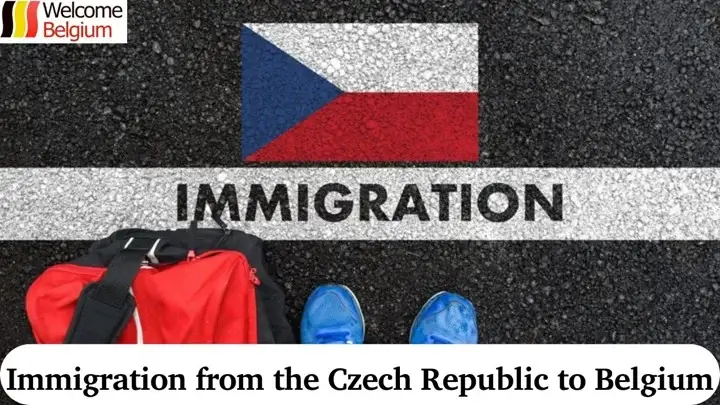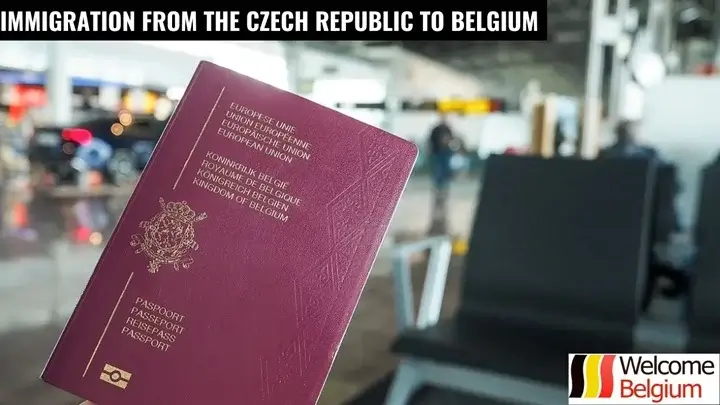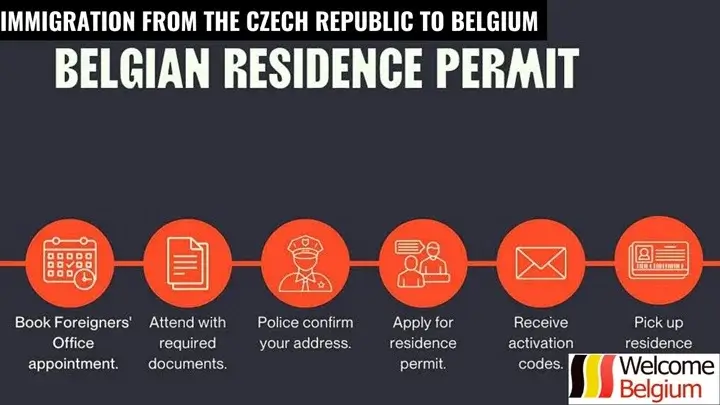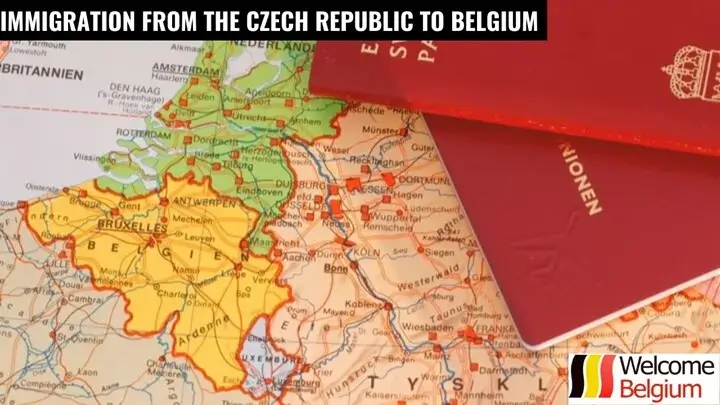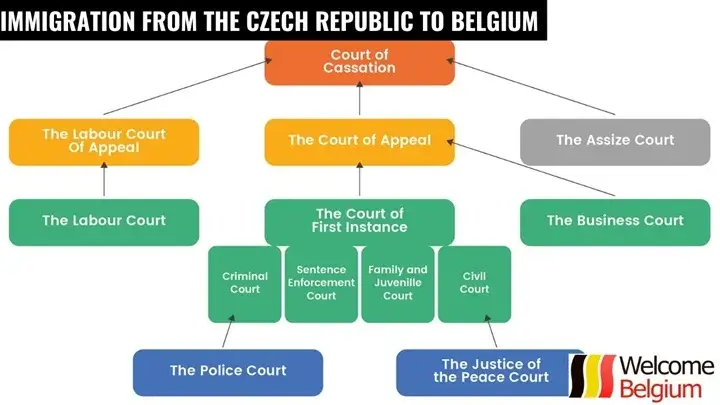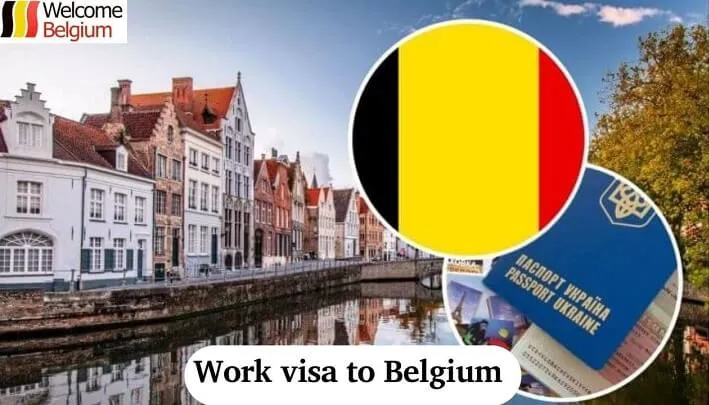Moving to another country is always a challenge, especially when it comes to Belgium with its rich culture and strict immigration rules. Residents of the Czech Republic who decide to take this step can count on a variety of opportunities, from employment to education. It is important to understand all the nuances of the process in order to avoid complications and adapt to a new life faster. This guide will help you understand the basics of moving and adapting to immigration from the Czech Republic to Belgium.
Reasons for immigration
Immigration from the Czech Republic to Belgium is popular for those seeking new career opportunities, high quality of life and access to international education. Economic stability, along with its cultural diversity, attracts Czechs who are ready for change. Many also choose to move to join their families or participate in business projects. It is important to understand what visas are required when emigrating to Europe and how to avoid problems when crossing the border.
Types of visas for moving to Belgium:
- Work visa
- Suitable for those planning to work in Belgian companies.
- The registration process includes submitting an application, a contract with an employer and proof of income.
- About 200 euros.
- From 1 to 3 months.
- Student visa
- For admission to Belgian universities or language schools.
- An invitation from the educational institution, documents confirming payment for tuition and medical insurance are required.
- From 150 euros.
- Up to 2 months.
- Family visa
- It is issued for reunification with relatives living in Belgium.
- Documents confirming the relationship and proof of income of the host party are required.
- About 180 euros.
- Up to 6 months.
- Business visa
- For entrepreneurs opening a business in the country.
- The package of documents includes a business plan, evidence of financial stability and company registration.
- From 300 euros.
- Up to 4 months.
Not having a visa when moving may result in entry denial, deportation or fines. Such actions may complicate future trips to EU countries, which should be taken into account when moving from the Czech Republic to Belgium. Even a temporary stay without a visa or registration entails administrative problems. To avoid risks, it is recommended to study all the requirements in advance and prepare the necessary documents.
Find out about the peculiarities of living in Belgium in our article.
Advice:
To speed up the visa application process, use online platforms that offer verification and collection of the necessary documents for moving to Belgium from the Czech Republic.
The process of obtaining a residence permit (RP)
Obtaining a residence permit in Belgium is a key step for Czech citizens who want to live and work in this country. The process of obtaining a residence permit has several stages, each of which requires precision and attention. This is the next stage of immigration from the Czech Republic to Belgium. It is important to familiarize yourself with the requirements in advance and prepare for the necessary procedures. In this section, we will tell you in detail how to go through all the stages of obtaining a residence permit in Belgium for Czechs.
Stages of obtaining a residence permit for Czechs in Belgium:
- Preparation of documents
Collect all required documents: passport, photographs, proof of financial solvency, etc.
Where to apply:- Local municipality in the country (address varies by region).
- Website: www.belgium.be
- Phone: depends on the region.
- Filling out the questionnaire and submitting the application
The application for a residence permit must be submitted to the local office of the migration service. Where to apply:- Visa and migration service centres (addresses on the website of local authorities).
- Website: www.ivd.be
- Phone: Depends on the region.
200-300 euros (depending on the type of visa).
Usually from 1 to 3 months.
- Undergoing a medical examination
To obtain a residence permit, you will need to undergo a medical examination confirming your health and the absence of dangerous diseases. Where to apply:- Laboratories and medical centers accredited by the Belgian authorities.
Website: www.medical.be
Cost of services: about 50-100 euros.
From 1 to 2 weeks.
- Laboratories and medical centers accredited by the Belgian authorities.
- Receiving a decision and issuing a residence permit
After submitting all documents, you will be informed of the decision on issuing a residence permit. If the answer is positive, you will need to visit your local office to receive a residence permit card. Where to apply:- Municipality or migration service centre.
Website: www.belgium.be
Around 50–100 euros for a residence permit card.
1 to 2 weeks.
- Municipality or migration service centre.
If you are refused a residence permit during the process, it is important not to despair. First of all, find out the reason for the refusal and, if possible, correct the deficiencies in the documentation or re-apply to move from the Czech Republic to Belgium. In case of repeated refusal, you can go to court or file a complaint against the decision. It is also useful to consult with an immigration lawyer who will help speed up the process of obtaining a residence permit.
What schools for refugees are there in Belgium? Find out from this article.
Advice:
Prepare all documents in advance and monitor changes in legislation to avoid unpleasant surprises in the process of obtaining a residence permit.
Obtaining Belgian citizenship
For Czechs wishing to become Belgian citizens, the citizenship process may seem complicated, but with the right preparation it is quite doable. At the initial stage, it is important to collect all the necessary documents and understand the basic requirements for candidates. Knowledge of languages, permanent residence and work experience are key conditions for successful citizenship and immigration from the Czech Republic to Belgium. It is important to understand what steps to take to avoid delays and refusals.
Stages of obtaining citizenship:
- Collection of documents
Basic documents: passport, proof of permanent residence, income certificates, knowledge of the language. Where to apply: local authorities (municipality).
About 100-150 euros (depending on the region).
From 6 months to 2 years. - Language Proof
You must pass a test of one of the official languages (Flemish, French, German). Where to take it: examination centres or local language courses.
About 100–200 euros per test.
Waiting time: depends on the centre. - Applying for citizenship
You must contact your local municipality or immigration office to submit your documents. Address and website: local government office or official website of the federal government. Cost of services: from 150 to 300 euros.
From 6 months to 2 years. - Waiting for a decision
Document verification process.
From 6 months to 2 years.
Contact details: the application status can be tracked through the local municipality.
If citizenship has been denied, you have the right to appeal if the refusal was wrong. This will require consultation with a lawyer who can help you understand the legal aspects of the issue in order to move from the Czech Republic to Belgium. It is important to comply with all conditions and deadlines when re-applying, if necessary.
Details about the integration of foreigners in Belgium.
Advice:
Knowing one of the country’s official languages can significantly speed up the process of obtaining citizenship.
Rights and obligations of residents
When immigrating from the Czech Republic to Belgium, it is important to carefully study the country’s legislation to avoid unpleasant situations in the future. Understanding your rights and responsibilities will help you not only integrate into a new society, but also avoid legal problems. Belgium has strict laws regarding labor relations, social guarantees and taxation, so knowledge of these rules is extremely important. In this part of the article, we will consider the basic rights and responsibilities of residents of Belgium, as well as legislative features for Czechs.
Rights and responsibilities:
- Labor rights and responsibilities
- Employment contract. In Belgium, employment relations are regulated by both national laws and collective agreements. An employment contract must be signed before work begins.
- Minimum wage. There is a set minimum wage that varies by sector. Legislation protects workers from being paid below this level.
- Protection from dismissal. The employee is protected from arbitrary dismissal. In case of dismissal, the employer is obliged to pay compensation or perform other legal procedures, according to the law.
- Working hours. The maximum number of working hours per week is 38 hours, with the possibility of overtime at agreed times.
- Social rights
- Health insurance. All residents of Belgium are required to be insured under the social security system. The insurance covers most medical expenses. This is important to know when analyzing benefits and privileges in Belgium.
- Unemployment benefits. In the event of job loss, Czechs, like other residents, may apply for unemployment benefits if they meet the requirements of the system.
- Pension payments. Belgium has a compulsory pension system in which all able-bodied citizens and residents participate.
- Taxation
- Personal income tax. The Belgian tax system is progressive, meaning that the tax rate depends on the level of income. There is also the possibility of tax deductions for people with children or disabilities.
- Value Added Tax (VAT): In Belgium, VAT is 21% on most goods and services.
- Property Taxes: Property owners are required to pay property taxes, which vary by region.
Failure to comply with the laws when moving from the Czech Republic to Belgium can lead to serious consequences, including fines, deportation, or even a ban on returning to the country. Ignoring labor or tax obligations can affect your legal status and financial well-being. Therefore, it is important to carefully study the legislation and follow it for a safe and stable life in a new country.
Vocational training for refugees is organized in Belgium.
Important:
To avoid tax problems, it is important to remember that it is important to declare all sources of income, including those coming from abroad.
Adaptation in the country
Immigration to Belgium from the Czech Republic can be a real challenge, especially in the first months. Residents of the Czech Republic often face language barriers, finding housing and work, and the need to get used to new rules and traditions. Overcoming these difficulties takes time and effort, but with the right approach, Czechs in Belgium can easily adapt to a new country. In this section, we will talk about the most important aspects of adaptation that can help Czech immigrants in Belgium.
Tips for Czechs to adapt to Belgium:
- Language adaptation. One of the biggest challenges for Czech immigrants is the language barrier. There are three official languages spoken here: Dutch, French, and German, depending on the region. It is best for Czech citizens to start by learning the language of the region they are moving to. Many courses and free resources are available for new immigrants, and the sooner you start, the faster you will be able to communicate and integrate into the peculiarities of Belgian culture.
- Finding a place to live. Finding a place to live in Belgium can be challenging, especially in larger cities like Brussels or Antwerp. The main websites for renting in Belgium include Immoweb and Zimmo. It’s important to familiarise yourself with local rental laws and tenant rights in advance. Tip: Start your search early and be prepared to provide all the necessary documentation, such as proof of income and a reference from a previous landlord.
- Job search. Working in Belgium for Czechs can be quite competitive, especially if you don’t speak the local language. A good place to start is updating your CV in English and registering on job search platforms such as LinkedIn, Indeed and VDAB. You should also pay attention to jobs for foreigners in Belgium, where specialists with international experience are in demand, such as IT or engineering. Tip: many companies offer courses for expats to help improve language skills.
There are many organisations and national communities in Belgium that help immigrants adapt to their new life. Government services such as Actiris in Brussels or VDAB in Flanders offer employment and training programmes for new residents. There are also a number of charities and Czech communities that offer advice and support to Czech immigrants, helping them integrate into society. This will help them adapt to the country when moving from the Czech Republic to Belgium.
Advice:
Czech immigrants in Belgium can join Czech cultural and social associations to help them adapt and stay in touch with their native culture.

